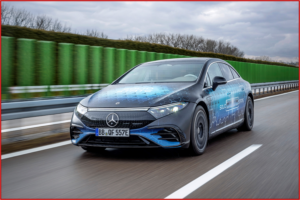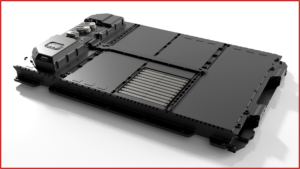
Click for more.
Mercedes-Benz (MBGAF) said today that its engineers from the road and racetrack worked in collaboration with Factorial* cell engineers to deliver an all-new solid-state battery test program, resulting in the first car – an EQS Sedan** – powered by a lithium-metal solid-state battery on the road.
“Developing an automotive-scale solid-state battery underlines our commitment to innovation and sustainability. We’re therefore excited to announce that we’ve started road testing with a prototype vehicle equipped with this advanced technology. We will gain crucial insights into possible series integration of this cutting-edge battery technology,” said Markus Schäfer, Member of the Board of Management of Mercedes‑Benz Group AG. Chief Technology Officer, Development & Procurement.

Click for more.
Solid-state batteries are an encouraging technology in electric mobility. The use of a solid electrolyte instead of liquid enhances cell safety and allows for the use of new anodes such as lithium-metal, significantly outperforming conventional lithium-ion cells and enabling higher energy densities. The solid-state technology reduces battery weight and has the potential to increase the gravimetric energy density for vehicle batteries up to 450 Wh/kg at the cell level, thereby increasing electric range. [Gravimetric energy density refers to the amount of energy stored in a battery cell per unit mass and is fundamental for evaluating the efficiency and performance of battery cells, especially in electric vehicles where weight is a critical factor.]
After intensive testing on various test benches, the prototype solid-state battery was integrated into a Mercedes-Benz EQS Sedan at the end of 2024. The vehicle was slightly modified to fit the solid-state battery and equipped with all accessories to operate it. The first laboratory vehicle tests were conducted in Stuttgart at the end of 2024 to prepare for the road tests that started in February 2025.
Mercedes AMG High Performance Powertrains (HPP), a wholly owned subsidiary of Mercedes-Benz Group specializes in Formula 1 technologies, and the Mercedes-Benz Center of Competence for Battery Systems designed and developed a completely new battery system. “In addition to its prowess on the racetrack, HPP is capable of rapidly transferring F1 technologies and expertise into high performance automotive projects,” Mercedes said.
*Factorial Inc.
Founded and headquartered in the United States, Factorial says it develops solid-state battery technology that offer longer range per charge, increased safety and cost competitiveness with conventional lithium-ion batteries. The company’s proprietary solid-state platforms FEST® (Factorial Electrolyte System Technology) and Solstice™ use electrolyte innovations that enable safe and reliable cell performance with high-capacity cathode and anode materials. Factorial’s FEST® solid-state batteries are designed to integrate seamlessly with existing manufacturing processes, ensuring scalability and efficiency. The company has established joint development agreements with leading global automakers, including Mercedes-Benz.
**AutoInformed on

About Ken Zino
Ken Zino, editor and publisher of AutoInformed, is a versatile auto industry participant with global experience spanning decades in print and broadcast journalism, as well as social media. He has automobile testing, marketing, public relations and communications experience. He is past president of The International Motor Press Assn, the Detroit Press Club, founding member and first President of the Automotive Press Assn. He is a member of APA, IMPA and the Midwest Automotive Press Assn.
He also brings an historical perspective while citing their contemporary relevance of the work of legendary auto writers such as Ken Purdy, Jim Dunne or Jerry Flint, or writers such as Red Smith, Mark Twain, Thomas Jefferson – all to bring perspective to a chaotic automotive universe.
Above all, decades after he first drove a car, Zino still revels in the sound of the exhaust as the throttle is blipped during a downshift and the driver’s rush that occurs when the entry, apex and exit points of a turn are smoothly and swiftly crossed. It’s the beginning of a perfect lap.
AutoInformed has an editorial philosophy that loves transportation machines of all kinds while promoting critical thinking about the future use of cars and trucks.
Zino builds AutoInformed from his background in automotive journalism starting at Hearst Publishing in New York City on Motor and MotorTech Magazines and car testing where he reviewed hundreds of vehicles in his decade-long stint as the Detroit Bureau Chief of Road & Track magazine. Zino has also worked in Europe, and Asia – now the largest automotive market in the world with China at its center.


Mercedes-Benz Testing Solid State Battery on Roads
Click for more.
Mercedes-Benz (MBGAF) said today that its engineers from the road and racetrack worked in collaboration with Factorial* cell engineers to deliver an all-new solid-state battery test program, resulting in the first car – an EQS Sedan** – powered by a lithium-metal solid-state battery on the road.
“Developing an automotive-scale solid-state battery underlines our commitment to innovation and sustainability. We’re therefore excited to announce that we’ve started road testing with a prototype vehicle equipped with this advanced technology. We will gain crucial insights into possible series integration of this cutting-edge battery technology,” said Markus Schäfer, Member of the Board of Management of Mercedes‑Benz Group AG. Chief Technology Officer, Development & Procurement.
Click for more.
Solid-state batteries are an encouraging technology in electric mobility. The use of a solid electrolyte instead of liquid enhances cell safety and allows for the use of new anodes such as lithium-metal, significantly outperforming conventional lithium-ion cells and enabling higher energy densities. The solid-state technology reduces battery weight and has the potential to increase the gravimetric energy density for vehicle batteries up to 450 Wh/kg at the cell level, thereby increasing electric range. [Gravimetric energy density refers to the amount of energy stored in a battery cell per unit mass and is fundamental for evaluating the efficiency and performance of battery cells, especially in electric vehicles where weight is a critical factor.]
After intensive testing on various test benches, the prototype solid-state battery was integrated into a Mercedes-Benz EQS Sedan at the end of 2024. The vehicle was slightly modified to fit the solid-state battery and equipped with all accessories to operate it. The first laboratory vehicle tests were conducted in Stuttgart at the end of 2024 to prepare for the road tests that started in February 2025.
Mercedes AMG High Performance Powertrains (HPP), a wholly owned subsidiary of Mercedes-Benz Group specializes in Formula 1 technologies, and the Mercedes-Benz Center of Competence for Battery Systems designed and developed a completely new battery system. “In addition to its prowess on the racetrack, HPP is capable of rapidly transferring F1 technologies and expertise into high performance automotive projects,” Mercedes said.
*Factorial Inc.
Founded and headquartered in the United States, Factorial says it develops solid-state battery technology that offer longer range per charge, increased safety and cost competitiveness with conventional lithium-ion batteries. The company’s proprietary solid-state platforms FEST® (Factorial Electrolyte System Technology) and Solstice™ use electrolyte innovations that enable safe and reliable cell performance with high-capacity cathode and anode materials. Factorial’s FEST® solid-state batteries are designed to integrate seamlessly with existing manufacturing processes, ensuring scalability and efficiency. The company has established joint development agreements with leading global automakers, including Mercedes-Benz.
**AutoInformed on
About Ken Zino
Ken Zino, editor and publisher of AutoInformed, is a versatile auto industry participant with global experience spanning decades in print and broadcast journalism, as well as social media. He has automobile testing, marketing, public relations and communications experience. He is past president of The International Motor Press Assn, the Detroit Press Club, founding member and first President of the Automotive Press Assn. He is a member of APA, IMPA and the Midwest Automotive Press Assn. He also brings an historical perspective while citing their contemporary relevance of the work of legendary auto writers such as Ken Purdy, Jim Dunne or Jerry Flint, or writers such as Red Smith, Mark Twain, Thomas Jefferson – all to bring perspective to a chaotic automotive universe. Above all, decades after he first drove a car, Zino still revels in the sound of the exhaust as the throttle is blipped during a downshift and the driver’s rush that occurs when the entry, apex and exit points of a turn are smoothly and swiftly crossed. It’s the beginning of a perfect lap. AutoInformed has an editorial philosophy that loves transportation machines of all kinds while promoting critical thinking about the future use of cars and trucks. Zino builds AutoInformed from his background in automotive journalism starting at Hearst Publishing in New York City on Motor and MotorTech Magazines and car testing where he reviewed hundreds of vehicles in his decade-long stint as the Detroit Bureau Chief of Road & Track magazine. Zino has also worked in Europe, and Asia – now the largest automotive market in the world with China at its center.